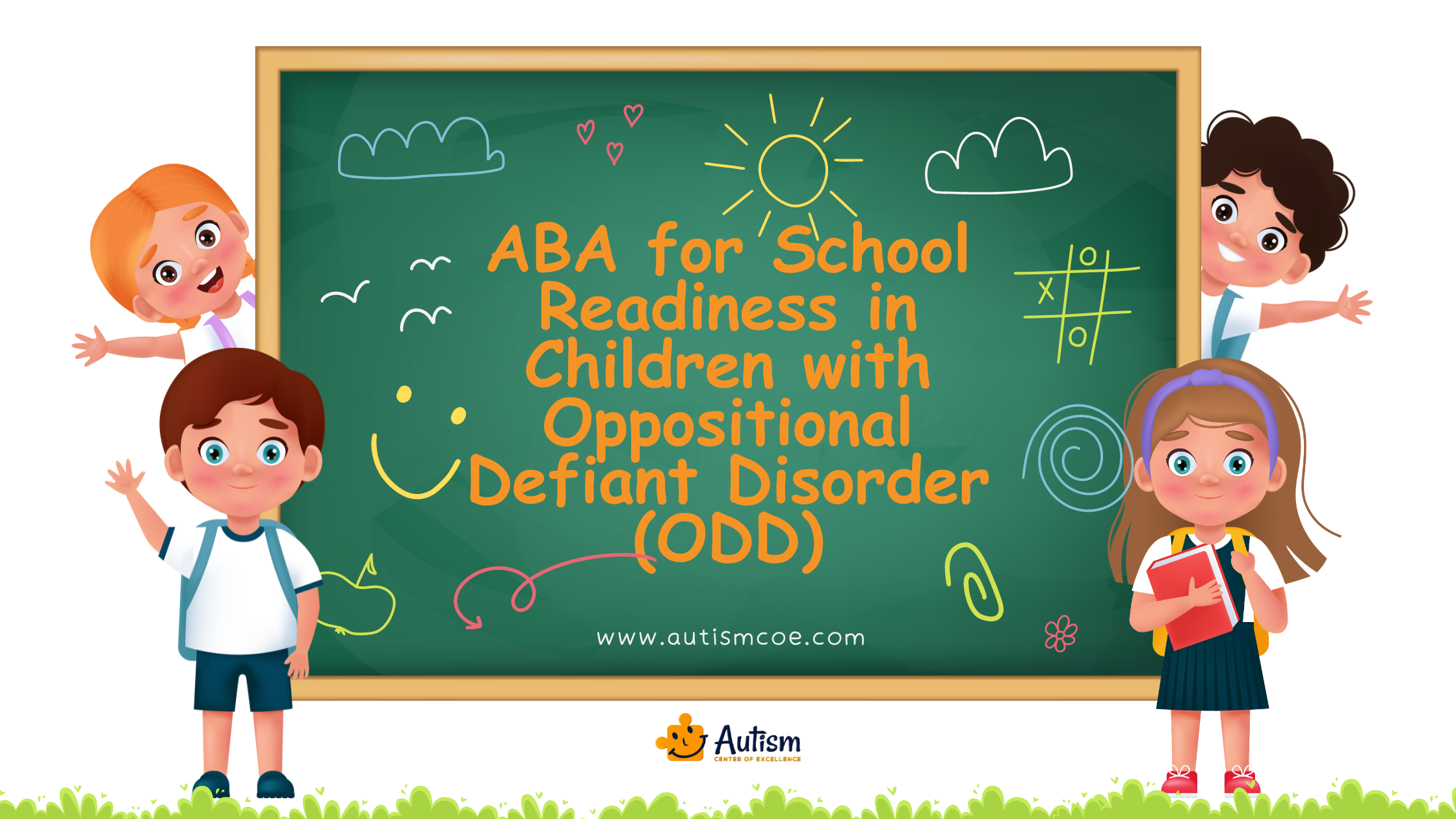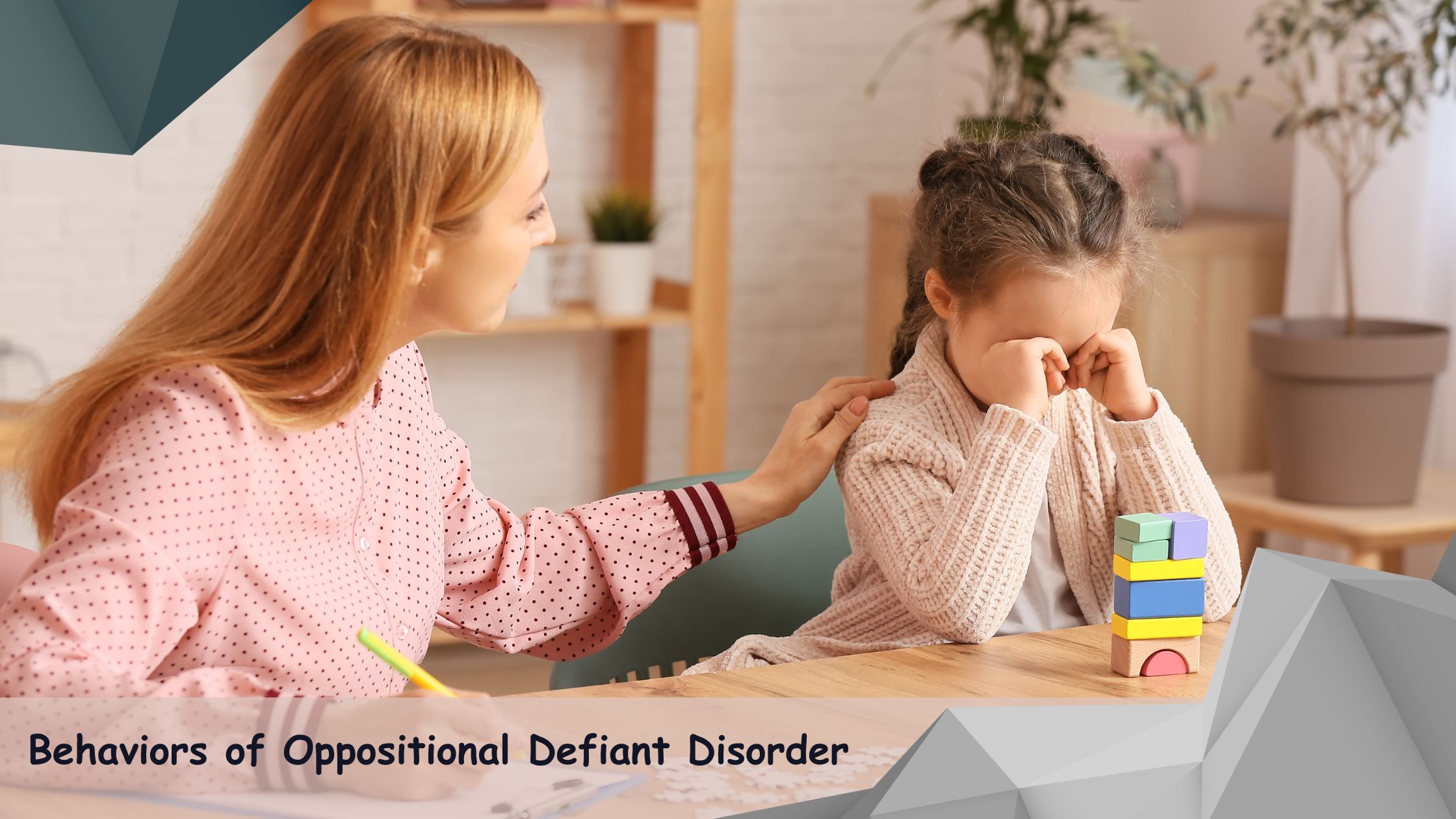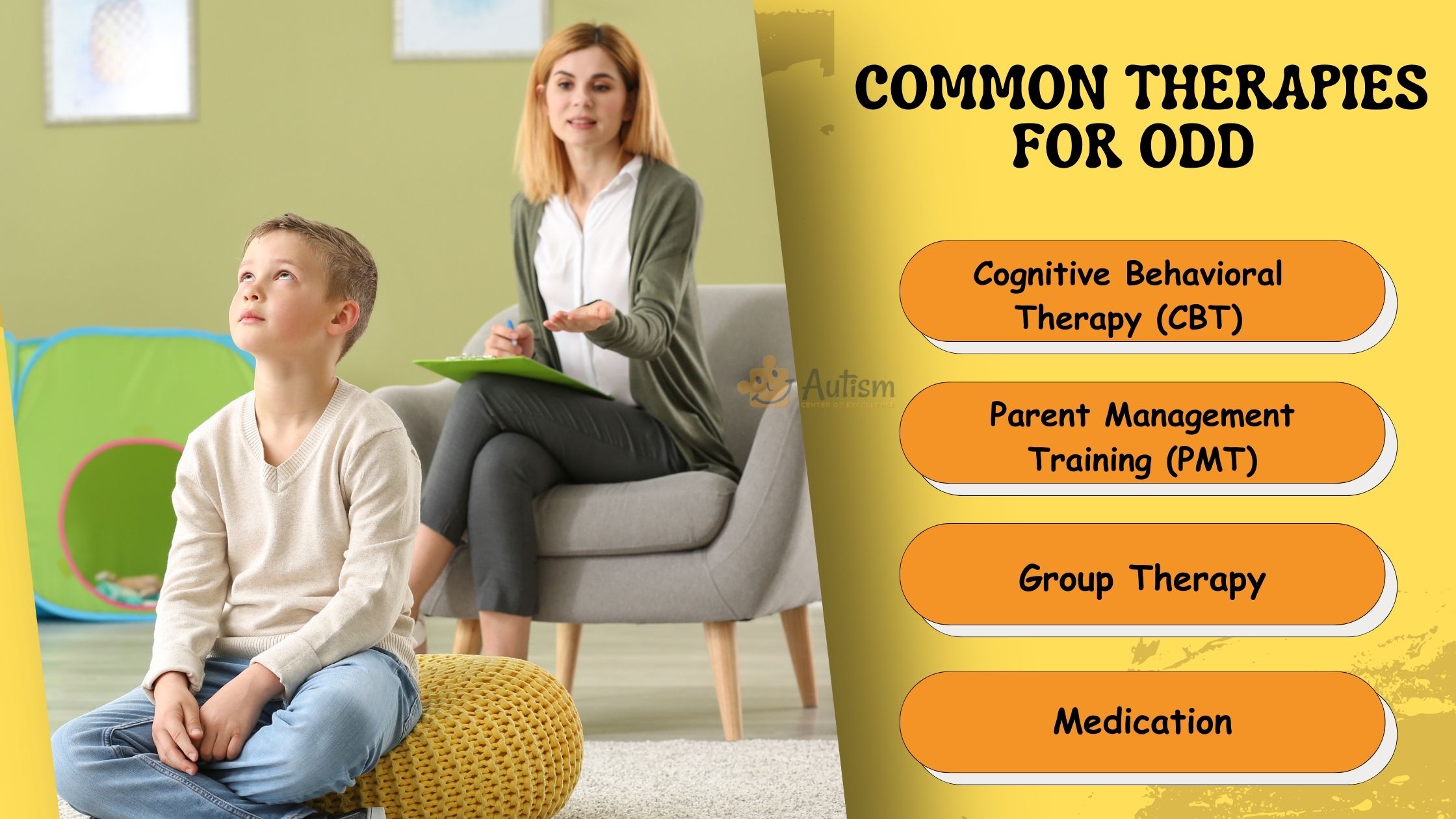Unit 19: ABA for School Readiness in Children with Oppositional Defiant Disorder (ODD)

If your child has Oppositional Defiant Disorder (ODD), the question is how you can provide some tips for his successful school season. ODD is one of the disorders that starts to emotionally get out of control, making kids angry, defiant, and resentful toward adults, like their parents, teachers, or other adults. Kids who have (ODD) may find it a struggle to respect people’s rights, obey rules, respond to requests, assume responsibility, and mix with others in a civilized manner. Such conduct can undermine and damage their academic performance and make them face poor social relationships, depression, and low self-esteem.
One of the pivotal points in ODD treatment is Applied Behavior Analysis (ABA) Therapy. This method is beneficial because it guides the child from negative behaviors and helps them learn new and better social skills. ABA treatment is tailored to every kid’s demands and may involve behavioral, cognitive, and social-communication approaches.
What are the Behaviors of Oppositional Defiant Disorder?
Oppositional Defiant Disorder (ODD) is a mental health condition that is often seen or encountered in childhood and adolescence. It is marked by a proven pattern of constant upset interference, hostility, and aggression toward the authorities in one’s life, such as one’s parents, instructors, and other adults in the community. Children with ODD commonly have difficulties complying with the rules, accepting the limits set on them, respecting others, sharing with them, and following the commands given in a way that they understand them. They should behave in ways that are either unintentionally frustrating, hateful, or bitter.
The changes that bipolar occurs in kids are not usually happening. It is a debilitating disease that can cause notable impairment in the various aspects of life like home, class, social, and workstations. Besides that, ODD can also boost the probability that one can experience other psychological hardships, e.g., anxiety, depression, alcohol or drug abuse, conduct disorder, and sociopathy.

What’s the Difference Between ODD and ADHD?
ODD and ADHD are two neurodevelopmental disorders, differed by their causing process, signs, and treatments. Here are some of the main differences between ODD and ADHD:
👨⚕️ ODD (Oppositional Defiant Disorder)
👉Children with Oppositional Defiant Disorder (ODD) are usually known for inappropriate behavior. They rush to get mad, defy orders, and retaliate toward the authority figures such as parents, teachers, or others.
👉This usually occurs before children turn 8. However, it may be as late as 12 years.
👉Often, when diagnosed, ODD is on the grounds of six or more months of persistent anger or irritability, disagreement with persons in authority, and defiance that impairs the person at school, home, or community.
👉Sometimes, medication is added for comorbid conditions. Psychotherapy mainly includes parent management training (PMT), family therapy, or cognitive-behavioral therapy (CBT).
👨⚕️ ADHD(Attention Deficit Hyperactivity Disorder)
👉People with ADHD struggle with problems with concentration, quick fatiguability, and self-control.
👉 ADHD often starts in childhood. However, it may continue to be used for other age groups, such as adults.
👉ADHD occurs when inattention or hyperactivity-impulsivity symptoms, or both, exist in a child and are persistent to the point of interfering with daily tasks and learning.
👉The management of ADHD includes the use of medications and psychotherapy techniques such as stimulant therapy (behavioral and CBT).
At times, ODD and ADHD coexist in an individual. In around 60% of these cases, people with ADHD also tend to have an ODD. Such a massive reduction may lead to complications such as difficulty in diagnosing the disease as well as providing treatment. Thus, it would be advisable for both the person and the guardian foreseeing ODD or ADHD to visit the physician. Early intervention helps these disorders result in better impairment and suitability of lives for people with these disorders.
What Are the 3 Symptom Categories of Oppositional Defiant Disorder?
The three symptom categories of Oppositional Defiant Disorder (ODD) are:
- Angry and irritable mood: These symptoms include being angry easily, being touchy, being annoyed excessively, and being angry or resentful.
- Argumentative and defiant behavior: This group encompasses behaviors that include disagreeing with authorities, refusing to do what is being requested by others, bothering others just to get them irritated, irritating them, and blaming others for mistakes or misbehavior.
- Vindictive behavior: Here, the subsection states the symptoms that belong to this category, namely being mean or malicious, engaging in a revenge adventure, or harboring feelings.
For a diagnosis of ODD, a child or a teen must have occurrences from any of the categories that last for more than 6 months and continue to be seen in one or more common settings like home, school, or social gatherings. It should be clear that ODD is not a normal part of developing personality/ behavior. Individuals with depression who suffer from such a diagnosis may cause them and their loved ones much stress and strain in various aspects of life. The ODD may cause co-occurrence of other mental health conditions, for example, anxiety, mood orders, the use of substances, aggressive behavior, or even the formation of personality disorders.
What Are the Possible Causes of Oppositional Defiant Disorder (ODD)?
ODD is a mental dysfunction that makes kids behave improperly and angrily. They hate their elders and mock at the authority figures. The exact causes of ODD are not fully understood, but they may involve a combination of genetic and environmental factors:
1. Temperament
Children who have difficulty handling their emotions might for example get easily upset or not able to cope with disappointment.
2. Parenting issues
A kid who is a victim of abuse or lack of general parenting, or harsh and unpredictable punishment or invariantly insufficient supervision by his/her guardians.
3. Other Family Issues:
For instance, the family could consist of a kid who lives in a volatile family setting or suffers from a parent with a mental illness or substance use disorder.
4. Environment:
If a kid learns not to behave right around their peers by gaining their attention or by avoiding a teacher’s punishment, they will keep such habits.

What Are Some Common Therapies for ODD?
Oppositional Defiant Disorder (ODD) is a mental health disorder that, in children and adolescents, makes them more likely to be irritable, defiant, or spiteful towards adults, including their parents or teachers. ODD will likely hinder how these children accomplish their school curriculum, as well as build social skills and their self-esteem. Such issues can be mental health. ODD is treatable. There are a number of treatments that enable children and adults with ODD to be able to better master their emotions and refrain from acting impulsively. Some of the common therapies for ODD are:
1. Cognitive behavioral therapy (CBT):
Provide the teachers and support staff with workshops on tools and techniques that are specially designed to be effective in teaching individuals with autism. They might involve interventions from ABA, thus other evidence-based practices might be effective.
2. Parent management training (PMT):
This kind of therapy is contrary to the first type of psychoanalysis. It teaches parents on how to use positive reinforcement, persistent discipline, and problem-solving techniques in an attempt to reconstitute the behavior of a child. Concurrently, PMT works on parents’ ability to create a better connection with their child and, so, reduces the level of family conflicts and stresses.
3. Group therapy:
This is a therapeutic manner of interacting with those who suffer from ODD and have issues or goals similar with those people. In group therapy, there is a provision of a secure and supportive place where ODD people are able to talk about how things happened to them, share ideas, and even practice new skills with others.
4. Medication
In spite of the fact that those medicines itself is not a prime treatment for ODD, it could be prescribed to manage co-educational conditions like attention deficit hyperactivity disorder (ADHD) or mood disorders. Medication may help qualified people those with ODD to manage impulsivity, hyperactivity, longevity, or anxiety.
Such therapies might shape in children with ODD the skills and behaviors required for successful school attendance, contribution to the community, and personal health. Treatment helps the one with ODD to get knowledge on how to stay cool emotionally, negotiate their needs, obey the rules put and socialize in a civilized manner. Psychological interventions as well can alleviate the stressful and anxious states that those with ODD may suffer sometimes as a result of changing schools or growing up into adults. Social skills training and other therapies are designed to unlock the maximum potential of students with ODD.
Join Our Weekly Newsletters!
Subscribe now to stay updated with our latest email updates.
ABA Strategies for Addressing ODD in School Readiness
Besides being used to work on kids with ODD, which causes them to exhibit behaviors such as defying rules, anger, and being vindictive to the authority, ABA can deal with the above challenges as well. A character-specific aspect of ABA can make children with ODD monitor the rules, demand instructions, accept responsibility, and socialize. These skills are vitally important for children to have the necessary skills for School Readiness since they can be more focused students and participate positively in social activities.
AB therapists have many strategies that will help children with ODD to adapt skills that will prepare them for school settings. Some of these strategies are:
Discrete Trial Teaching: This is a strategy that focuses on the learning of particular skills or behavior patterns by breaking them down into small parts, giving clear instructions, favoring the right answer, encouraging positive responses and correcting errors.
Naturalistic Teaching: This approach acts as a more flexible and natural learning method, where the learning situations are developed around the child’s interests, preferences, and motivations. Hence, the child learns the skills and behaviors in the natural environment.
Pivotal Response Treatment: It involves a strategy that is aimed at enabling skills/behaviors that are considered to be of importance/essential for the child’s development such as motivation, response, initiative, and management of self.
Token Economy: It is like an accepting system; a whiteboard for children’s desired behaviors that are exchanged for preferred items or activities. The tokens will act as an instrument of showing obedience, participating, finishing the assigned tasks and showing cooperation, as well as engaging in positive communication.
Contingent Observation: This includes withdrawal (granting time-out) from a reinforcing circumstance (for example, playing with peers) in the event of disrupting behavior (like bullying or extinction). The child resorts to this situation after a while, when they are more calm, and when they follow the rules.
Hence, such techniques would facilitate children with ODD to acquire the skills and behavior being needed to academic success. Due to ABA therapy, children with ODD might be able to learn how to regulate their emotions, express their needs, behave in the appropriate manner, and function well in social circles. ABA treatment can also diminish the anxieties and the nervous pressures that kids with ODD could be getting as part of the transition to school. The comprehensive treatment plan offered by ABA Therapy enables children with ODD to fulfill their academic and personal achievements.
Frequently Asked Questions & Answer
Q1. What are the Educational Implications of Oppositional Defiant Disorder?
Some of the students with ODD may find it difficult to attend, read, compose, or deal with mathematics. Some individuals could also experience emotions plucking that is related to verbal expressions hence language difficulties as well. ODD can cause students not to be able to make friends and to communicate effectively. Along with that, lack of self-esteem can result to ODD students.
Q2. What is Oppositional Defiant Disorder in School Age Children?
Most of the diagnosis takes place in children. Relating to classmates, parents, teachers and anybody in authority, the children who have ODD are petulant, revolutinist and antagonistic. They are more nervous-wrecking to the victims than they care about them.
Q3. How Do You Treat Oppositional Defiant Disorder in School?
Make such ODD student remarks in low private tones; do not hint at doing challenges for the kid to do in public. A positive note mentioning a show of good behavior, such as remaining seated when recommended, keeping silent at an appropriate time, taking turn during class discussion and exhibiting appropriate behavior by being polite might be helpful.
Q4. How Can I Help My 13 year Old with ODD?
The kid with an ODD are generally treated with a lot of complex therapies such as social skills training, individual and/or family therapy, parenting education and parent-child training. Besides hormonal imbalance, in the case of other disorders, medication might also be recommended.
Conclusion
Research has shown that ABA Therapy is an evidence-based approach that successfully makes changes to the behavior of Oppositional Defiant Disorder (ODD) in children. ODD is a disorder in which children feel so irritable, disobedient, spiteful, and disrespectful toward the people that detain some kind of authority in their life, for example, parents, teachers, or other adults. Young people with ODD may sometimes battle obeying the rules, carrying out requests, owning up to their responsibilities, and getting along with their colleagues. Such behaviors can negatively affect their social and educational development and may contribute to depression and lowered self-esteem. If you want to try an ABA Therapist who has a lot of experience and is qualified to deal with your child who is diagnosed with ODD, you can call AutismCOE. The current ABA treatment by AutismCOE is well-known for ASD and development-stage problems. As an Autism Center of Excellence, we care for your child with a competent and well-trained team of dedicated professionals who are passionate about their services.
Please Note: The content of this blog is for informational purposes only and should not be considered a substitute for professional medical advice, diagnosis, or treatment. Consult a qualified healthcare professional for personalized guidance tailored to your specific situation.

Bhavika Bhasin
Bhavika Bhasin is the Research and Marketing officer at AutismCOE. She works with children and adults with ASD. Her clinical research includes evaluating various available autism screening and diagnosis methods and their efficacy. She is currently developing a novel screening exam that is indicated to be more accurate than the existing available exams. She is also writes articles papers for various publications.

